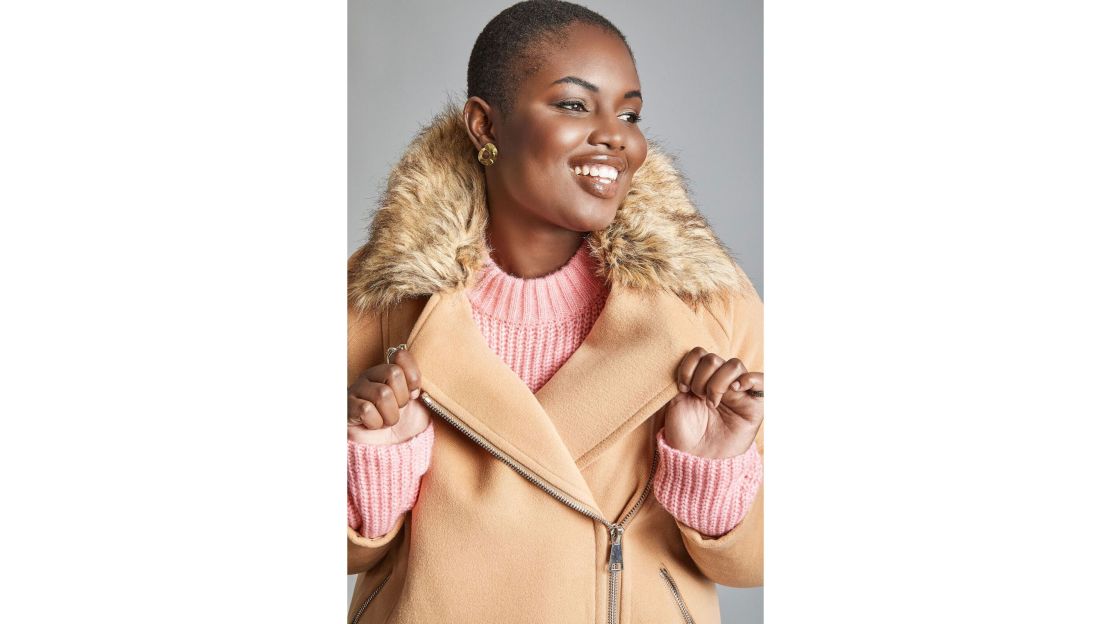Retailers are waking up to a $21 billion industry they have mostly ignored for years: Plus-size women’s clothing.
More than half of US women ages 18 to 65 wear a size 14 or higher, according to statistics cited by Walmart. Analysts expect that number to grow.
Yet extended sizes represent less than a fifth of women’s overall clothing sales, retail think tank Coresight Research estimated in a report earlier this year.
Top retailers are racing to strengthen their selection to capture new shoppers and meet increasing demand for trendy women’s clothing in a broader range of sizes.
For example, Walmart (WMT) bought plus-size clothing brand Eloquii last week. Eloquii makes clothes exclusively for women sizes 14 and above. The move was Walmart’s latest move into the plus-size industry: The company launched Terra & Sky, a private label brand, earlier this year. And Modcloth, the startup Walmart bought last year, sells extended sizes.
Other companies have taken mixed approaches to bolster their plus-size assortment.
Old Navy announced a “Size YES” campaign and will bring its formerly online-only plus collection to 75 stores. J Crew is partnering with Universal Standard for expanded sizes on a fall and winter collection.
Nordstrom (JWN) is trying to eliminate gaps in sizes by adding more 14, 16 and 18 choices at 30 stores, with 100 brands. It’s also adding more signs in stores that highlight the options and featuring a broader range of mannequins.
Target (TGT) and Kohl’s (KSS) have focused on their plus-size private labels. Kohl’s said would launch EVRI — a “relevant fashion wear” brand — and sell Nike Plus, both debuting in the spring.
“Brands and retailers are now seeing plus-size as a significant growth opportunity,” said Neil Saunders, managing director at GlobalData Retail. “What was once a specialist segment is now becoming mainstream.”

‘She was not recognized’
For years, brands, fashion designers, and retailers have failed to offer fashionable plus-size styles, analysts say.
Choices have been mostly limited to oversized tops and dresses and stretchy leggings. “Things that cover rather than highlight and flaunt,” said Elizabeth Shobert, director of marketing and digital strategy at fashion analytics company StyleSage.
Stores marginalized shoppers searching for extended sizes by displaying a sparse assortment in separate sections at the back or on higher floors. Many high-end designer brands have been unwilling to make clothes in extended sizes. Shoppers have had to rely on specialty stores like Lane Bryant and Catherines to find variety and innovative clothes.
“This customer was not thought about. She was not recognized,” said Eloquii CEO Mariah Chase. “The options that were given to her were subpar and a sea of sameness. There was a fear among retailers of taking real risks in terms of design and fit.”
Eloquii was founded in 2011 by The Limited. In 2013, The Limited shut it down, but the brand quickly relaunched as an independent direct-to-consumer online seller.
Riding a loyal customer base eager for contemporary looks, Eloquii’s sales have tripled since 2015 with a mix of tailored basic and on-trend dresses, tops, pants, jackets, and lingerie.
“Our goal was to wake up an industry that was not being inclusive of a customer that wanted to buy fashion,” Chase said. Eloquii has recently launched a workwear line and is collaborating with designer Jason Wu on a fall collection.

Designing the right fit
While retailers have poured money into research and technology to stay ahead of trends in so-called standard sizes, they have often lacked creativity in introducing plus-size clothing.
Shobert said many brands have struggled to answer basic questions with their extended sizes: Do you price a size 24 the same as a 2? Where do you put the clothes in the store and online?
Producing the right fit has also been problematic. When making an item of clothing, retailers usually take an average size and scale the dimensions up and down. But that has led to poor-fitting clothing in extended sizes.
“You have to have the right kind of talent, design, and product development that have worked with plus sizes and understand some of these specific challenges,” Shobert added. “Some companies haven’t necessarily had that.”
Higher manufacturing costs have held back the plus-size segment, too. More fabric is used when producing extended sizes and additional design and fabrication expenses can come into play during the process, according to Saunders from GlobalData Retail.
“If the volume isn’t there, then it is hard to make the business model work,” he said.
#EffYourBeautyStandards
The success of mid-priced, plus-size online retailers like Eloquii, Evli, Torrid, Gwynnie Bee and Dia & Co. have forced big brands and retailers to renew their attention on the industry.
Online shopping opened up new opportunities for both sellers and customers: Brands previously hesitant to showcase their plus sizes on store floors could easily offer them on their websites, said Jane Hali, a retail analyst for Jane Hali & Associates who has been following the industry since the 1980s.
“There is a feeling of embarrassment having to shop for clothes in a separate store or department,” she said. “Plus-size consumers prefer to shop a retailer’s core offer rather than a specific plus-size sub-brand.”
Under pressure to grow, retailers have reacted to shoppers who demanded more authentic-looking advertising. They’re also responding to the rise of social media influences like Tess Holliday and Ashley Graham, and body-inclusivity movements like #EffYourBeautyStandards.
“Women who wear plus sizes have been vocal in recent years, particularly on social media, about their desire to buy fashionable, trendy clothes in the same fabrics and styles as offered in so-called straight sizes,” Deborah Weinswig, founder and chief executive of Coresight Research, said in a report.
Eloquii’s Chase noted that the “power dynamic has been upended” between brands and women who want more inclusive sizes. “This customer said, ‘Why aren’t you serving me?’”




